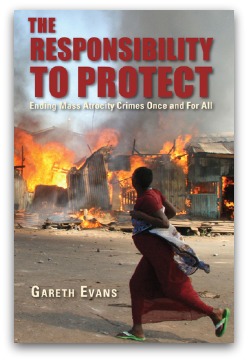 'Wars can be prevented just as surely as they can be provoked, and we who fail to prevent them must share in the guilt for the dead.' General Omar Bradley, June 1948
'Wars can be prevented just as surely as they can be provoked, and we who fail to prevent them must share in the guilt for the dead.' General Omar Bradley, June 1948
In recent days there has been much discussion of the intervention in Libya with some (including in Eureka Street) arguing that the imposition of a UN mandated no-fly zone represents an affirmation of the concept of an international 'Responsibility to Protect' (R2P).
Much of the commentary conveys a distorted conception of what R2P actually means and what it requires of the international community.
Many seem to regard R2P as a doctrine which licences military protection to intervene to protect civilians wherever their lives are threatened by murderous governments or forces. However, R2P (as detailed by Gareth Evans in his book Responsibility to Protect) is a complex concept, and in fact emphasises the 'responsibility to prevent' as much as it does the responsibility to intervene.
Bernard Kouchner, co-founder of Medicins Sans Frontieres and former French Foreign Minister, gave the idea of humanitarian intervention new life when he coined the term droit d'ingerence or right to intervene in 1987. This expression was given oxygen by the 1992 intervention in Somalia, when a language was being sought to characterise the paradoxical idea of a humanitarian invasion.
It is important to be clear about the limitations of 'the right to intervene' in comparison with R2P: a 'right to intervene' licences the intervention of the international community in response to humanitarian crises. It is a concept that can be employed only in reaction to a developing crisis and a concept which focuses solely on the deployment of force.
R2P works differently and more comprehensively. As Evans argues, R2P is above all about taking preventive action to pre-empt and defuse emerging crises.
There are several different stages of R2P that can be activated before military intervention is considered. To begin with, R2P emphasises the need for analysis and thus for advanced warning of developing crises. It was with this in mind that the International Crisis Group was founded in 1995 to monitor crisis situations around the world.
If the international community maintains up to date information on tenuous situations around the globe, it is much more likely to be alert to possible crises.
R2P also underlines the need for political and diplomatic strategies which can be employed to defuse crises. Diplomatic intervention and mediation can be used alongside economic leverage and social strategies to prevent antagonistic parties from resorting to violent means.
While the current intervention in Libya and the 1999 intervention in Kosovo are R2P related, a better example of the principle in action is seen in the efforts of the Christian community of Sant Egidio in Mozambique.
In 1990, Sant Egidio, who had worked in Mozambique for some years and had established relationships on the ground, were asked by the ruling FRELIMO party and the Mozambican National Resistance to mediate between the two warring factions.
Through these negotiations, Sant Egidio played a key role in the 1992 Rome General Peace Accords which marked the resolution of the conflict. They continue to work on peace initiatives in the Democratic Republic of the Congo, Algeria, and the Balkans.
This kind of ongoing work, constant engagement with and monitoring of communities, truly embodies the R2P doctrine.
A doctrine which allowed for military intervention in response to crises at the flick of a diplomatic switch is neither desirable nor adequate. What is more, it would not be politically workable and may well be counter-productive to the resolution of conflicts.
Such a doctrine would not have the political support necessary to allow it to become established as a norm in international relations. The five countries that abstained from the UN Security Council Vote on Resolution 1973 (the intervention in Libya) included four of the world's major emerging economies (India, China, Brazil and Russia) and the largest European country, Germany.
All of these states, which will play an increasingly hefty role in international decision making this century, have deep-seated reservations about intervention and its implications for state sovereignty.
By confusing R2P with the blanket 'right to intervene', we lessen the possibility that the more comprehensive R2P doctrine might be adopted by governments who have hitherto held reservations.
Ultimately, a meaningfully swift response to crises is dependent upon there being an international norm with a sound theoretical foundation, clear parameters, and consensus support.
It is important that people understand R2P properly and then advocate for its full realisation. That is, that we call on governments to devote the proper resources to monitoring crisis situations, and for diplomatic and aid efforts to be directed towards defusing them. Only as the last resort, when all preventive actions have been exhausted, should the deployment of force be contemplated.
This is not to say that R2P does not sanction the use of force where other measures fail; it does. But it understands military action as only one tool in a large tool box.
 Ben Coleridge studies Arts at the University of Melbourne.
Ben Coleridge studies Arts at the University of Melbourne.